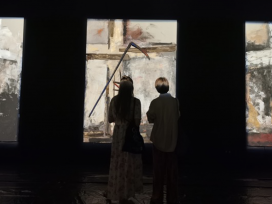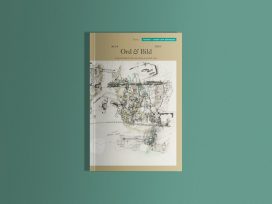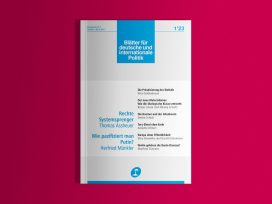The well known Maribor gallery owner Primož Premzl is distressed by the provincialism and low mentality on display in Slovenia’s Styrian capital, in anticipation of grandiosely announced explosions of culture. He has placed a poster displaying a countdown to 1 January 2012, when Maribor will officially become a European Capital of Culture, in front of his studio. The title of his project is “Farm in the City GoGo” – where GoGo alludes to one of the main protagonists of the ECC story, who is also the director of the Lent Festival and the target of criticisms regarding the lucrative purchase of farmland for his private use. Whether he also had in mind “farm” as a favourite synonym for an idiotic show we cannot say. The picture on the poster displays a local weirdo, now deceased, standing next to a barrel of wine on which is written “Only 640 more days until an explosion of culture.”
What led this gallery owner to display an ironic countdown to the coming explosion of European dimensions, as it is described, so long in advance of the ill-reputed event? Clearly he had in mind the spectacle-like discourse, internationalized with the inevitable use of the letter x in the word itself, with which we are being deluged by all the protagonists involved. Recently, these have multiplied with every extra million of funding: local authorities, who boastfully promise us cultural excesses, cultural managers, without even trying to hide their initial shady deals, and of course the media and its apparatus, whose well-oiled machinery prepares the PR ground for the first two groups. This incestuousness among politicians, local cultural posers, and journalists is of course a special phenomenon that likely had to find none other than Maribor and the ECC project in order to be expressed in all its vain grandiosity rather than through the usual more modest doses.
Indications that Premzl will produce sufficient laughter and irony are ample. “So that there will be a cultural explosion,” the mayor of Maribor confirmed at a recent round table discussion hosted by the daily newspaper Večer. The slogan is not a new one: it was launched in August of 2009, if not before, when Maribor was confirmed as a candidate for the project. The Minister of Culture also gave expression to the same discourse, saying that the project was financially at a point “when pure energy has begun to spurt out, as Mayor Kangler would say.” And then she spiced it up, probably cynically by this point, with one more metaphor: “Everything is packed up and ready to gush out.” This is of course the moment when the cultural gush mentality of Maribor finally revealed its “macho” image, with the well known refrain from the popular turbofolk song “Gushing fire hose”. There is no other comparison, since in Slovene no one has yet referred to the spurting and gushing of culture.
This almost phallic-like promise heralds the return of masculinity to Maribor, the return of its cultural and intellectual equality. The firefighter metaphors offered up as an overture are likely not merely an echo of an awkward peasant turn of phrase from those who do not know exactly what they would like. Because in this respect, the Maribor mayor on the one hand, with his rural roots and Duplek pedigree, which presumably makes him less sophisticated, differs not in the slightest from world-famous theatre cosmopolitan Tomaž Pandur, who is tipped to become the president of the programme council for the ECC. At the round table mentioned above, we heard from another rhetorically unbeatable figure who threw out the challenge: “Will we build a Potemkin village that will hide our misery and mediocrity, or will we truly explode in all our splendour?” We have no choice – of course we are in favour of the latter, we’re not idiots. Hence, in favour of Pandur and an explosion of splendour. This cheap exclusionary demagoguery of “either you are for the explosion of culture which I offer or you are miserable and mediocre” of course once again charmed the Maribor public, hungering for praise, and gave support to its faith that it will make the right choice, since no other alternative is permissible.
In all likelihood, this glib and contrived rhetoric could easily be dispensed with by a more well-intentioned understanding, if it did not hide some shady work in the organization of the ECC to date, and in its staff and programme changes and stumbling blocks, not to mention some financial transactions. But worst of all is the following: culture is, in the final analysis, a matter of identity, something which is part of our makeup. In this cross-section of city and culture, something unique is happening in connection with the organization of the ECC, based on something which for many long decades we have been cultivating under the name of the cultural greyness of the city. This greyness is clearly a symptom of newly emerging verbal dynamite mixtures. Because what else could produce a greater identity for Maribor if not the discovery of its lack, its externalization into some sort of identity explosion? In the course of which pieces will spurt in all directions, to the final nothingness, where we will fill the emptiness of our own hollowness with tons of dynamite which detonation will no longer contribute to the splendour promised by the programme maestros. A step away from being miserable and mediocre is more precisely a step into it.
The worst that can happen to us in this kind of vice is the dismissal of all critical voices. Večer’s clear summons, directed against critics of the ECC, unfortunately disallows any expression of doubt and labels it defeatist, malicious, and egotistical, thereby eliminating any basis for normal discussion. Not only do the local media PR agents cheer shamelessly for the protagonists of this cultural gushing, the spurt-masters, not only do they accuse anyone who dares voice doubt of lying, exaggeration, and envy, they also stigmatize them in advance as being responsible for anything that might go wrong. In this wonderful new media world of Maribor, the blame for the possible failure of the ECC is already assigned, and of course the credit for its success also. For PR agents like these, it is of course a win-win situation.
Moreover, they demand complete confidence in the authorities and their cultural favourites, and even speak of “the total absence and impossibility of dialogue”, which they say will impede the full realization of the project. In other words, first you move to denounce all critics, then you call for dialogue and complain when there isn’t enough of it. Talking to oneself is an enviable business, but it is also usually labelled insanity, at least in psychiatry. The ECC has become “the unit of our tolerance”, as they say in Večer, which can only mean that you are intolerant if you disagree with those who want to impose their own notions of fairness on others. Such touchingly open rooting for the organizers of the ECC, and against anyone who has the temerity to express scepticism about the success of the project, has not been seen for a long time. It is not the least bit surprising that we have to turn to non-Maribor media to learn of any criticisms about the events connected with the ECC, for example to Ljubljana’s Dnevnik. And what are we to do? We need to accept the challenge. Will we put our trust in this culture spurt or not? Some would rather wait for it to gush. Others believe that the very reference to a gushing fire hose, this vulgar domination of form over content, is already telling enough.






